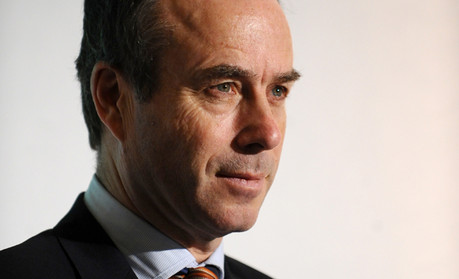
Lionel Barber told Leveson inquiry that the extent of the phone-hacking scandal had come as 'a real shock'
Credit: Dominic Lipinski/PAFinancial Times editor Lionel Barber said today that his newspaper's own code of conduct "was a model for journalism".
Giving evidence at the Leveson inquiry, Barber said that the FT aimed to set "the gold standard" in journalism by adhering to "the highest practices and standards".
He told the court: "I would argue that the Financial Times code of conduct is a model for self-regulation … because the penalties for not getting it right are severe."
He went on to call for tougher penalties for news organisations that break the editors' code of conduct, which he stressed needed to be administered by a new, more robust body rather than the PCC.
Asked about the need for the FT to have its own internal code of conduct, Barber said that the newspaper had a vital relationship with its readers "based on trust" and needed to "go beyond the PCC code".
He did credit the PCC code as being "pretty robust", and praised the regulatory body for being "timely, fair, and thorough", but he said it had "badly misstepped" over the phone-hacking scandal.
It's biggest mistake, Barber said, was criticising the Guardian over its reporting of the story, which it later emerged was far closer to the reality than the PCC's own conclusion at the time – that hacking was confined to one rogue reporter at the News of the World.
Barber told the court that the hacking scandal had been "a real shock" to him personally.
"It was a real shock, what happened at the News of the World, not just the extent, and the industrial scale, but the lies and also the result, which was shocking.
"The closure of a national newspaper, with a circulation of millions, a newspaper which has, in its own way, done some very good stories, this was a shocking episode.
"All of us believed we need to change the way we do business. If this isn't a wake-up call then what is?"
Barber called for members of a new self-regulatory system to be forced to give due prominence to corrections and face fines for breaches of its code.
He suggested that if the new body were to be sufficiently robust and credible, it would encourage news organisations to join, including news aggregators such as the Huffington Post.
Barber is one of three national newspaper editors giving evidence to the inquiry today. Independent editor Chris Blackhurst was quizzed about the newspaper's handling of the Johann Hari affair, and Tony Gallagher, editor of the Telegraph, will appear later this afternoon.
Free daily newsletter
If you like our news and feature articles, you can sign up to receive our free daily (Mon-Fri) email newsletter (mobile friendly).
Related articles
- Keeping the conversation clean: How AI helps the Financial Times moderate comments
- Five key takeaways from the UK select committee on the future of news
- Intensive AI training by FT Strategies and GNI open for applications
- From Reuters to The New York Times, Big Oil pays 'most trusted media brands' to push greenwashing
- How the Financial Times is broadening its portfolio









